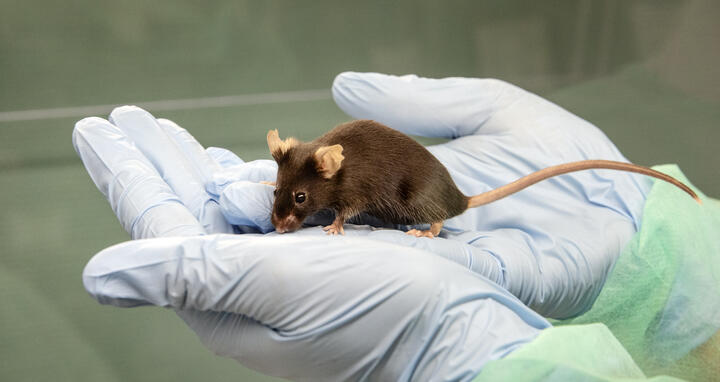Lab animal report for 2022
The Max Delbrück Center for Molecular Medicine in the Helmholtz Association and its partner institutions on Campus Berlin-Buch and at MDC-BIMSB in Mitte reported a slight increase in the number of animals used in research last year. Researchers used a total of 54,402 laboratory animals – mostly mice, rats and fish – in studies conducted in 2022. That is 2,270 more than in the previous year. The increase can be partly attributed to the fact that biomedical research operations were back in full swing in 2022, following a series of pandemic-related lockdowns. Furthermore, the number of animals used generally fluctuates when projects get underway or are completed, or when a new lab is opened or an existing one is closed.
The number of animals reported also includes animals used by individual research groups at Charité — Universitätsmedizin, the Leibniz Research Institute for Molecular Pharmacology (FMP), the Berlin Institute of Health at Charité (BIH), and the two spin-offs T-knife and Berlin Cures.
The researchers at the Max Delbrück Center analyze the molecular basis of health and disease, while making sure their studies adhere strictly to the 3R principles (Reduce, Refine, Replace). These are rigorously monitored and controlled. The Center is also committed to transparent communication about animal research and in July 2021 became one of the first research institutions to join the Transparent Animal Testing initiative.
Reduce, Refine, Replace
In addition, the Max Delbrück Center is involved in the Berlin-based Einstein Center 3R. Biomedical research institutions in the city have formed a collaborative network to improve unavoidable animal experiments and develop robust alternative methods that can be used by as many scientists as possible. Berlin offers the ideal environment for this.
Research teams as well as animal keepers at the Max Delbrück Center receive regular training regarding 3R methods. The research teams not only exchange experiences, but also work closely with each other to make lasting improvements in the way animal numbers are calculated. The Preclinical Research Center on the Buch campus provides the scientists with excellent conditions for refining necessary animal studies, to make sure the animals suffer as little as possible.
At the same time, the Max Delbrück Center wants to provide a realistic picture to the public and policymakers. In early 2023, the Center joined other Berlin institutions in the life sciences, especially members of Berlin Research 50, in issuing a statement on animal use in drug research and development. Animal welfare organizations had described a decision by the U.S. Food and Drug Administration (FDA Modernization Act 2.0) on preclinical drug testing as exemplary for Europe and Germany. Berlin’s research institutions responded by writing: “The FDA Modernization Act 2.0 facilitates the ongoing development of alternative methods ... and now allows these methods to be used when they are available. In doing so, the FDA is moving closer to longstanding European practice. Since Directive 2010/63/EU came into effect, it has been illegal in Europe to perform animal testing when proven alternative methods are available. The FDA and the EU provide ... a valuable incentive to develop and validate such methods. Yet in many cases, animal testing still plays an indispensable role in determining the efficacy and safety of drug candidates.”
Further information
- Why we cannot yet avoid animal testing
- Alternative methods to animal studies
- Research, animal experiments and the 3Rs
- Understanding Animal Research: Compass 2023
- Transparent Animal Testing initiative
- Laboratory animal report of the FMP for 2022
Kontakt
Jutta Kramm
Head of Communications
Max Delbrück Center
+49-(0)30-9406-2140
jutta.kramm@mdc-berlin.de or presse@mdc-berlin.de
- Max Delbrück Center
-
The Max Delbrück Center for Molecular Medicine in the Helmholtz Association (Max Delbrück Center) is one of the world’s leading biomedical research institutions. Max Delbrück, a Berlin native, was a Nobel laureate and one of the founders of molecular biology. At the locations in Berlin-Buch and Mitte, researchers from some 70 countries study human biology – investigating the foundations of life from its most elementary building blocks to systems-wide mechanisms. By understanding what regulates or disrupts the dynamic equilibrium of a cell, an organ, or the entire body, we can prevent diseases, diagnose them earlier, and stop their progression with tailored therapies. Patients should be able to benefit as soon as possible from basic research discoveries. This is why the Max Delbrück Center supports spin-off creation and participates in collaborative networks. It works in close partnership with Charité – Universitätsmedizin Berlin in the jointly-run Experimental and Clinical Research Center (ECRC), the Berlin Institute of Health (BIH) at Charité, and the German Center for Cardiovascular Research (DZHK). Founded in 1992, the Max Delbrück Center today employs 1,800 people and is 90 percent funded by the German federal government and 10 percent by the State of Berlin.








